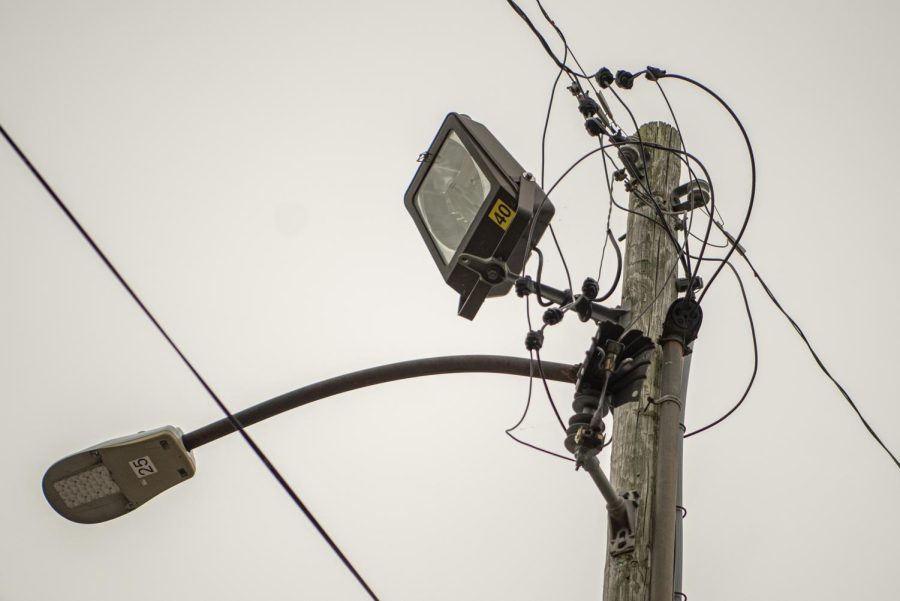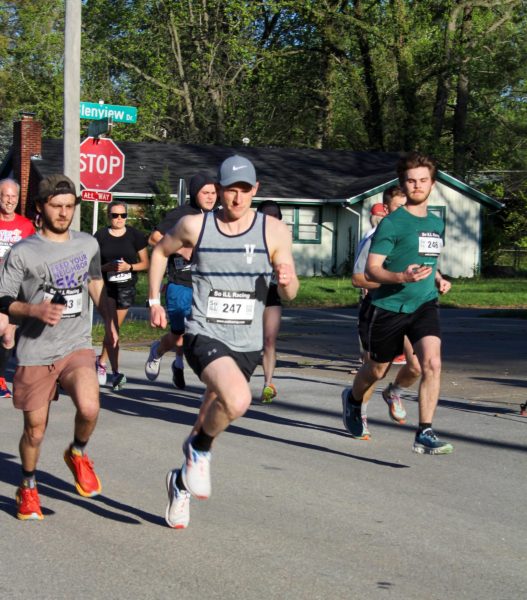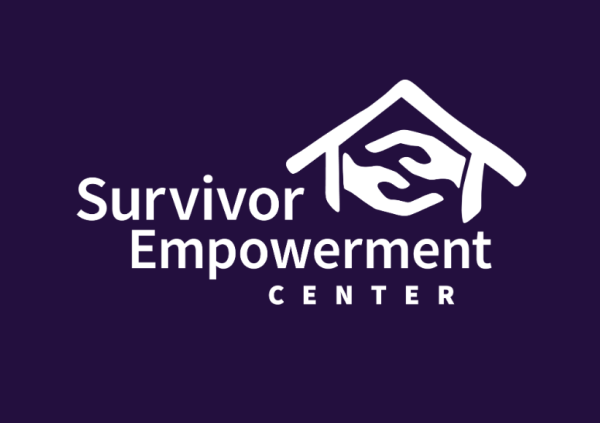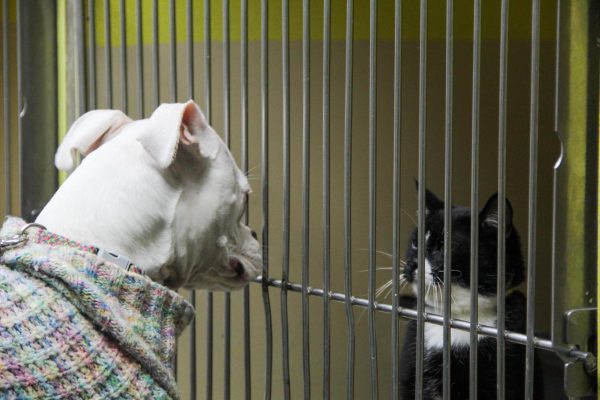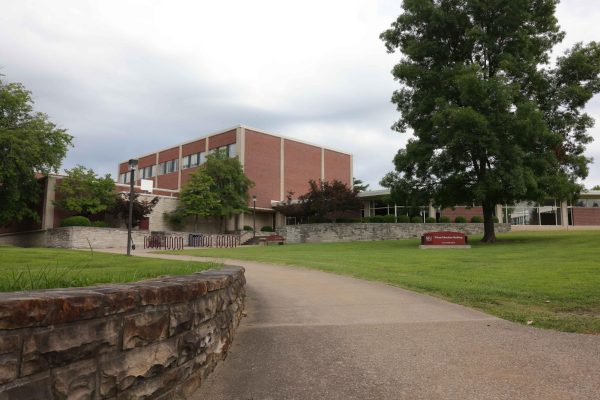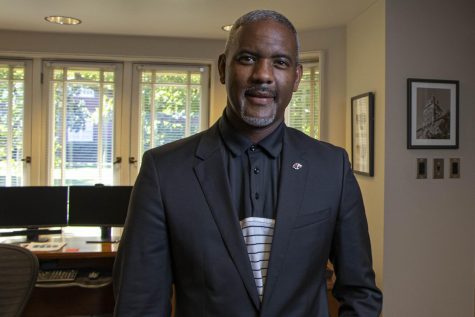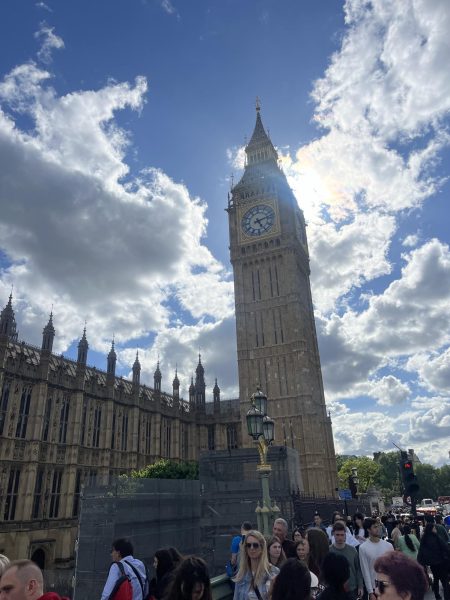City of Carbondale installs new anti-loitering system to deter violence near Town Square
The City of Carbondale has recently installed an anti-loitering system in the town square that uses flashing lights and loud classical music to prevent individuals from loitering in the area Tuesday, Oct. 5, 2021 in Carbondale, Illinois.
Speakers and lights were recently placed throughout Carbondale town square for what the city is calling an “anti-loitering system” to “deter the increase in violent crime in the area that began January of 2021.”
According to the city’s website, the system plays music at high volumes and illuminates the area at night in an effort to deter groups of people from gathering late at night and early in the morning in the town square area. City Councilwoman Ginger Rye Sanders said the city had to be proactive to make the area more safe.
Sanders was elected to the city council in April of 2021 with community police reform and neighborhood safety as a part of her platform, and pushed for the new “anti-loitering system.”
Advertisement
“I believe when you’re in a city and conditions change, you have to change with the conditions and try to see what works,” Sanders said.
According to the city’s data, since January, increased calls for service have been made to the area with the majority of them reporting crimes or asking for increased patrols. The crimes reported have included drug dealing, assaults and shootings, according to the city’s website.
Sanders said the anti-loitering system is used as an alternative to increasing police presence in the area, intended to deter the gatherings while leaving the square area open to the public, and maintaining a healthy atmosphere for businesses.
Sanders said the anti-loitering system is not intended to act as a deterrent for people experiencing homelessness, but it was put in place to make the community safer. She said the city looks to provide opportunities for its unhoused population through funding programs and institutions that frequently work with and provide for them.
“Carbondale has received $7.8 million from the American Rescue Fund,” Sanders said. “I would definitely say there is money available to these different organizations to present plans on what they want to do in order to help the homeless population, and I guarantee you Carbondale will be in the forefront to make sure their needs are met.”
Dona Reese, a professor in the School of Social Work at Southern Illinois University at Carbondale, said she’s concerned about the anti-loitering system’s long term efficacy due to Carbondale’s mistreatment of un-housed people in the past.
In August of 2019, Carbondale repealed a ban on panhandling that punished the offense with a fine or jail time if the fine could not be paid. The ban was campaigned against by the American Civil Liberties Union of Illinois as “being used to unfairly criminalize people experiencing homelessness for exercising their first amendment rights.”
Advertisement*
“In order to solve a social problem, you have to address the cause of it,” Reese said. “Their goal is just to move them to a different location. That will not solve the problem.”
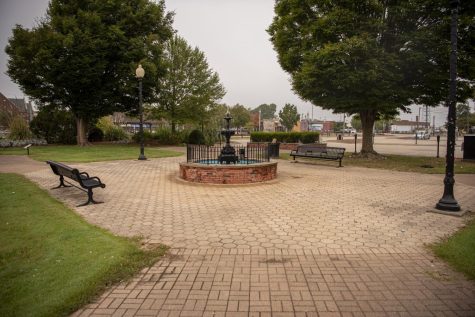
Reese said the root causes of homelessness and group antisocial behavior can be addressed through community efforts and organizations. She said programs aimed at youth and ex-convicts can be used to promote community engagement, and reduce the likelihood of people turning to criminal activity as a means of financial or community support.
“We have to have some community intervention to address gang activity and drug sales,” Reese said. “There are successful programs that can be undertaken to change that whole system.”
Reese said support for the local Center for Empowerment and Justice is a good step in assisting this process. She said the center, which works with ex-convicts to find stable work and opportunities after prison, helps to prevent potential recidivism by giving them a way to make money and interact with the community without turning to criminal activity.
Reese said serving the varied needs of the homeless population, including physical and mental healthcare, providing housing, and addressing the needs of unhoused children would better solve the root causes of homelessness.
“If you’re going to address the cause of poverty in order to solve it, then you need to provide solutions for poverty,” Reese said.
John Mandernach works at ABC Liquor, which is situated across the street from the “anti-loitering system.” Employees of the store, which closes at or after midnight most nights of the week, have regular interactions with the groups that congregate in the area.
“The employees do occasionally get confrontations from customers, and when there are larger gatherings, it’s more likely to happen,” Mandernach said.
Mandernach said he has not seen a significant difference in the size of the gatherings since the implementation of the new system. He said the gatherings have been allowed to have open alcohol containers, which he feels has encouraged people to gather there. He said he feels the gatherings may have a negative effect on how safe the area appears to the public, potentially leading to a decline in revenue for the store.
“I’m concerned not only about the peoples’ businesses, but I also heard that the homeless are complaining about this place too,” Sanders said. “I don’t even want a homeless person to have an accident, or to be caught where they would have an occasion to lose their lives.”
One of the organizations that has worked with the unhoused population has been the Carbondale Warming Center. Coordinator Carmalita Cahill has led the organization since December of 2019, throughout the COVID-19 pandemic.
The warming center works with more than a dozen other organizations, businesses and religious institutions to provide a safe, healthy environment for the area’s unhoused population. The Bethel African Methodist Episcopal Church, the Carbondale Interfaith Council, the Southern Illinois Coalition for the Homeless, the Southern Illinois Community Coalition and the Laborer’s Local 773 Union are among those who work with the Warming Center to provide for its operation, Cahill said in August.
“We offer a place to stay, and have served over 50,000 meals out of this building,” Cahill said. “That is [due] to the grace and generosity of the community we’re in.”
Since opening, the Carbondale Warming Center has had to adapt its operational procedures to respond to the outbreak of COVID in the U.S. by requiring multiple daily temperature checks for all who work or reside there and implementing hand washing measures before such measures were recommended by the CDC.
“Not only does it give us a sense of security, but I think it gives our guests a sense of security as well,” Cahill said. “We don’t have uncertainty over whether someone has a fever and they already know that that’s a part of us caring for them, so that’s amazing.”
The Carbondale Warming Center has also provided COVID vaccinations in clinics open to the public in collaboration with the Illinois National Guard and Southern Illinois Healthcare.
“I think we’ve gotten some people vaccinated that wouldn’t have been otherwise,” Cahill said. “When you do, you have more of a concern for their well being than you would just in general.”
Sanders said the Carbondale Warming Center was provided additional funding during the Sept. 28 council meeting through the American Rescue Fund. This is part of a larger push by the city to fund programs that will aid in keeping the streets safer by providing opportunities for the unhoused as well as providing community places for younger people, such as the Dentmon Center.
“I’m here to support the underserved and the underrepresented people that seem to think that their voice doesn’t matter,” Sanders said. “I’m on the city council to let them know that it does, because I do hear them, and whatever I can do to help them, that’s what I’ll be doing.”
Staff reporter William Box can be reached at [email protected] or on Twitter at @William17455137. To stay up to date with all your southern Illinois news, follow the Daily Egyptian on Facebook and Twitter.
Advertisement



